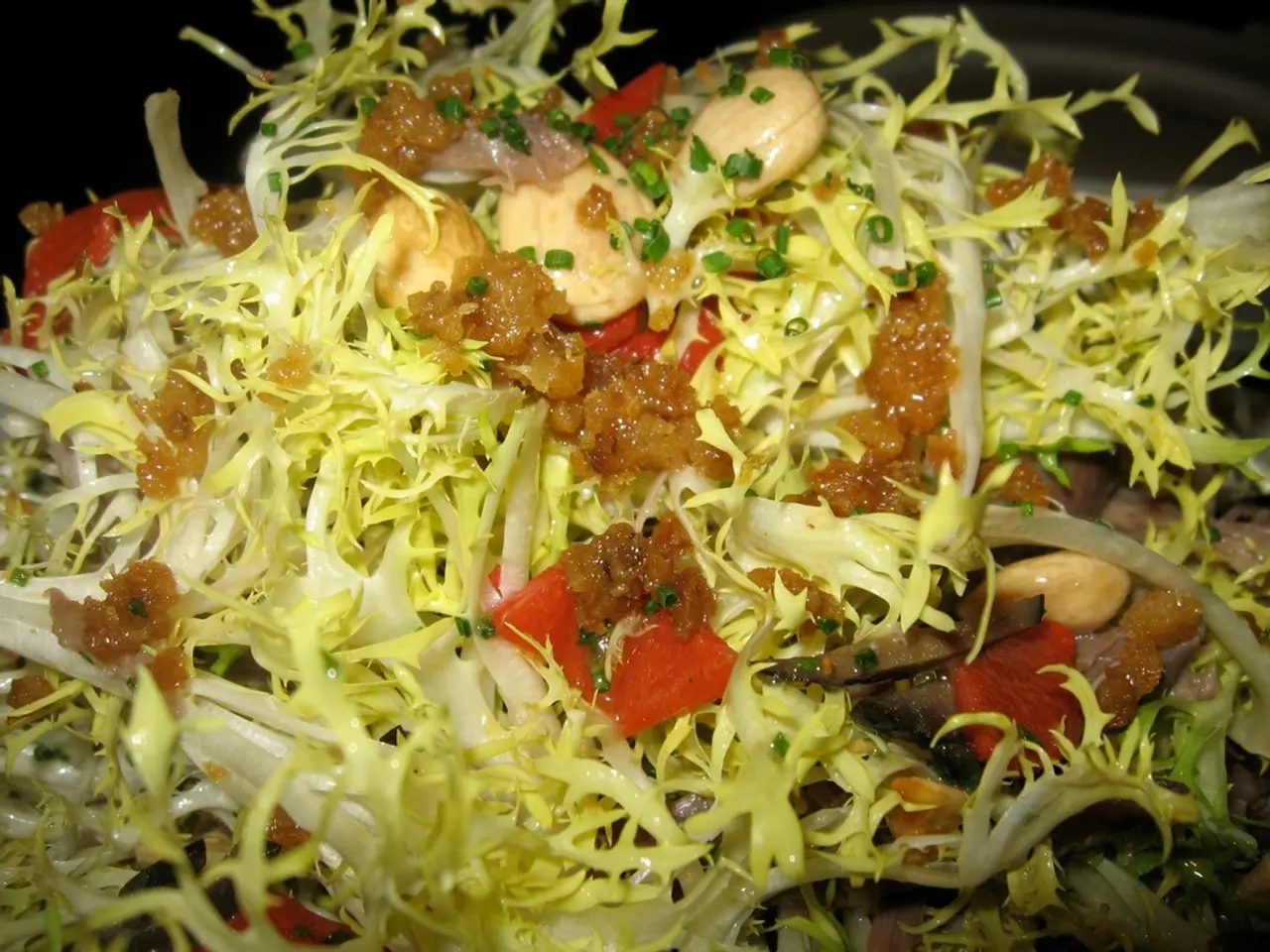Effect of Consuming Raw or Cooked Foods on the Digestive Process
In the ongoing debate about the benefits of raw versus cooked foods, it's clear that both have their unique advantages and drawbacks when it comes to digestion and gut health. By understanding the intricacies of each and finding a balance, individuals can optimize their digestive wellbeing.
Raw foods, such as fruits, vegetables, nuts, seeds, and sprouts, are often associated with freshness and vitality. They often contain higher levels of certain vitamins, enzymes, and antioxidants that can be sensitive to heat, potentially providing better nutrient retention. Eating raw fruits and vegetables is linked to improved mental health outcomes, such as reduced depressive symptoms and higher life satisfaction, possibly due to their high nutrient content or fiber[1][5].
However, raw foods can sometimes pose digestive challenges due to tougher fibers and anti-nutrients like lectins and phytic acid that interfere with nutrient absorption or irritate the gut, especially in sensitive individuals[1][3]. The risk of bacterial contamination and foodborne illness is higher with some raw foods, such as raw paneer or unpasteurized dairy products, which may be particularly problematic for people with health conditions like fatty liver[3].
Cooking, on the other hand, generally breaks down tough fibers and anti-nutrients, making foods easier to digest and some nutrients more bioavailable. Heat treatment reduces harmful bacteria, making foods safer and often better tolerated by the digestive system[3]. Cooking tomatoes, for example, increases the availability of lycopene, a powerful antioxidant linked to heart health and cancer prevention[5]. Cooking spinach, meanwhile, reduces its oxalate content, which can interfere with calcium absorption[5].
A healthy gut microbiome thrives on a varied diet consisting of both raw and cooked foods. Conditions like dysbiosis (microbial imbalance) or digestive sensitivities may require more cooked foods or careful food choices to avoid irritation and promote healing[2]. Fermented foods and drinks, such as kombucha, buttermilk, and kanji, are beneficial as they provide probiotics and enzymes that improve digestion and gut immunity[2][4].
To strike a balance for optimal digestion, it's recommended to incorporate a mix of raw and cooked vegetables and fruits to maximize nutrient intake and digestive comfort. Use cooking methods that preserve nutrients, such as steaming or light sautéing, to soften fibers without excessive nutrient loss[5]. Include probiotic-rich fermented foods regularly to support gut microbiome diversity and function. Avoid eating raw foods known to be problematic or risky for certain health conditions and opt for cooked versions to reduce toxins and bacterial risk[3].
By combining the nutrient density and enzyme benefits of raw foods with the digestibility and safety of cooked foods, and adding fermented options for microbial support, individuals can optimize digestion and maintain a healthy gut ecosystem effectively. Mindful eating, whether with raw or cooked foods, helps improve digestion by encouraging slower, more thoughtful chewing and a relaxed state, which supports the digestive process.
In conclusion, the key to optimal digestion lies in balance. By incorporating both raw and cooked foods into your diet and paying attention to your body's specific needs, you can support your digestive health and improve overall well-being.
[1] Fung, T. (2016). The Clean Food Cookbook: A Seasonal Guide to Eating Close to the Source. Ten Speed Press. [2] Sanders, M. E. (2014). The Probiotics Revolution: 7 Life-Changing Ways Fermented Foods Help You Lose Weight and Heal Your Gut. Rodale Books. [3] Weil, A. (2017). True Food: Seasonal, Sustainable, Simple, Pure: A Cookbook. Little, Brown Spark. [4] Whelan, K. (2018). The Complete Guide to Fermentation: 101 Recipes for Probiotic-Packed, Delicious Foods. Fair Winds Press. [5] Zeratsky, K. A., & Mattes, R. D. (2018). Nutrition and Health: A Comprehensive Textbook. Elsevier.
- Incorporating both raw foods like fruits, vegetables, nuts, and seeds with their higher nutrient content, and cooked foods for improved digestion and safer consumption can optimize nutrient intake and digestive comfort.
- A varied diet that includes both raw and cooked foods, along with fermented options, can help create a healthy gut microbiome, promoting digestion and gut immunity.
- When managing digestive conditions or health issues like fatty liver, careful food choices are important, sometimes requiring more cooked foods to avoid irritation and promote healing.
- Certain raw foods can pose digestive challenges due to tough fibers and anti-nutrients, while cooking generally breaks down these components, making foods easier to digest and more bioavailable.
- Mindful eating, whether with raw or cooked foods, encourages slower, more thoughtful chewing, and a relaxed state, which supports the digestive process, contributing to overall health and wellness.




